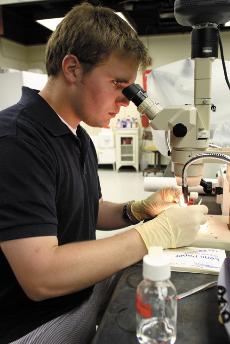Simply put, biology senior Rachel Nuwer’s topic for the March 30 undergraduate symposium was about two catfish and one carp. Nuwer could have studied those species of fish in the Mississippi River, but she chose to conduct her research thousands of miles away in the laboratories of Southeast Asia.
“I worked in a facility that was located on the banks of the Mekong River for a month and a half,” Nuwer said. “We did research all day long, starting from 6 in the morning to as late as midnight. Although it was hard work, I really enjoyed every minute of it.”
While in Asia, Nuwer worked under the direction of internationally accredited French scientist, Dr. Philippe Cacot.
Nuwer returned to Loyola after completing her research to compile her study titled, “Domestication of three indigenous fish species in the South of the Lao PDR: Experiments on the propagation of two catfish (Pangasianodon hypophthalmus and Hemibagrus wyckioides) and one carp (Cirrhinus microlepis).”
Other symposium participants did not take their projects out of Louisiana but still worked with acclaimed researchers on topics within the global scientific community.
The department of biological sciences’ symposium has been a showcase for remarkable research undertaken by undergraduate students for almost two decades. It is an opportunity for outstanding students to work with distinguished scientists and gain hands-on learning experience. Most student research is conducted in safe and sterile laboratories, but senior biology and psychology double major Amanda Rodrigue had a much more wild experience.
Rodrigue spent 40 hours a week with chimpanzees in Lafayette.
“The chimps were really cool. Most people never get that close to primates. I had a lot of fun learning about their interesting personalities, despite that they liked to throw feces,” Rodrigue said.
She worked with scientists at the University of Louisiana-Lafayette during the summer while researching her study titled, “Associative Concept formation in chimpanzees using a Habituation Learning Model.”
Rodrigue spent eight months preparing her presentation for the symposium and continues to add information to her writings.
“I have been attending the symposium since I was a freshman. I had always wanted to talk about my work on stage and get out of boring bio classes for a while,” said biology senior Jordan Ferrage.
Ferrage presented his research alongside Nuwer and Rodrigue at this year’s symposium. His research was primarily conducted in Loyola’s on-campus laboratories but he did occasionally travel across Freret Street to work with scientists at Tulane who specialize in developmental signaling.
Ferrage worked closely with Rosalie Anderson, assistant biology professor, to develop his topic and presentation, which was edited 12 times before March 30. He spent a year researching for his study, “The Developing Vertebrate Limb and Protease Treatment: Gene Expression and Morphological Changes.”
Ferrage said, “Dr. Anderson and I narrowed down my research to incorporate my strengths and subjects that I am interested in like genetics and molecular biology. I was still really nervous before the symposium, but once I got on stage the information streamed out of me, and it was over before I knew it.”
Nuwer, Rodrigue and Ferrage will graduate in May and recommend undergraduate students to participate in future symposiums or conduct research outside of class requirements.
“The lessons learned outside of the formal classroom are invaluable,” Nuwer said. “My experiences with this project helped clarify what I would like to research in the future and where my interests lie.” Rodrigue added, “Even if you never discover a big theory, you still learn about the scientific process, and it is the ultimate learning experience.”
Kathy Martinez can be reached at [email protected].







